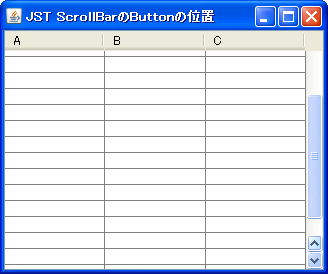Swing/ScrollBarButtonLayout のバックアップ(No.15)
- バックアップ一覧
- 差分 を表示
- 現在との差分 を表示
- 現在との差分 - Visual を表示
- ソース を表示
- Swing/ScrollBarButtonLayout へ行く。
- 1 (2011-05-16 (月) 15:08:24)
- 2 (2011-05-17 (火) 18:05:15)
- 3 (2011-06-07 (火) 16:53:07)
- 4 (2011-06-23 (木) 20:34:02)
- 5 (2011-12-15 (木) 03:03:45)
- 6 (2012-12-21 (金) 19:12:32)
- 7 (2013-10-10 (木) 11:33:56)
- 8 (2014-09-30 (火) 00:37:48)
- 9 (2014-11-11 (火) 19:36:59)
- 10 (2015-01-25 (日) 18:26:06)
- 11 (2016-08-03 (水) 17:01:50)
- 12 (2017-09-30 (土) 23:30:44)
- 13 (2019-03-26 (火) 19:07:28)
- 14 (2021-01-05 (火) 14:12:04)
- 15 (2023-06-29 (木) 15:39:14)
- 16 (2025-01-03 (金) 08:57:02)
- 17 (2025-01-03 (金) 09:01:23)
- 18 (2025-01-03 (金) 09:02:38)
- 19 (2025-01-03 (金) 09:03:21)
- 20 (2025-01-03 (金) 09:04:02)
- 21 (2025-06-19 (木) 12:41:37)
- 22 (2025-06-19 (木) 12:43:47)
- category: swing
folder: ScrollBarButtonLayout
title: JScrollBarのButtonの位置を変更
tags: [JScrollPane, JScrollBar, ArrowButton, LayoutManager]
author: aterai
pubdate: 2011-05-16T15:08:24+09:00
description: JScrollBarのスクロール移動Buttonの配置位置をレイアウトマネージャーを使って変更します。
image:

概要
JScrollBarのスクロール移動Buttonの配置位置をレイアウトマネージャーを使って変更します。
Screenshot

Advertisement
サンプルコード
scrollbar.setUI(new WindowsScrollBarUI() {
// Quote from javax.swing.plaf.basic.BasicScrollBarUI
@Override protected void layoutVScrollbar(JScrollBar sb) {
Dimension sbSize = sb.getSize();
Insets sbInsets = sb.getInsets();
/*
* Width and left edge of the buttons and thumb.
*/
int itemW = sbSize.width - (sbInsets.left + sbInsets.right);
int itemX = sbInsets.left;
/* Nominal locations of the buttons, assuming their preferred
* size will fit.
*/
boolean squareButtons = false;
// DefaultLookup.getBoolean(scrollbar, this, "ScrollBar.squareButtons", false);
int decrButtonH = squareButtons
? itemW : decrButton.getPreferredSize().height;
int incrButtonH = squareButtons
? itemW : incrButton.getPreferredSize().height;
// int decrButtonY = sbInsets.top;
int decrButtonY = sbSize.height - (sbInsets.bottom + incrButtonH + decrButtonH);
int incrButtonY = sbSize.height - (sbInsets.bottom + incrButtonH);
/* The thumb must fit within the height left over after we
* subtract the preferredSize of the buttons and the insets
* and the gaps
*/
int sbInsetsH = sbInsets.top + sbInsets.bottom;
int sbButtonsH = decrButtonH + incrButtonH;
// need before 1.7.0 ---->
int decrGap = 0; //ins
int incrGap = 0; //ins
// incrGap = UIManager.getInt("ScrollBar.incrementButtonGap");
// decrGap = UIManager.getInt("ScrollBar.decrementButtonGap");
//<----
int gaps = decrGap + incrGap;
float trackH = sbSize.height - (sbInsetsH + sbButtonsH) - gaps;
/* Compute the height and origin of the thumb. The case
* where the thumb is at the bottom edge is handled specially
* to avoid numerical problems in computing thumbY. Enforce
* the thumbs min/max dimensions. If the thumb doesn't
* fit in the track (trackH) we'll hide it later.
*/
float min = sb.getMinimum();
float extent = sb.getVisibleAmount();
float range = sb.getMaximum() - min;
// float value = getValue(sb); // del
float value = sb.getValue(); // ins
int thumbH = (range <= 0) ? getMaximumThumbSize().height
: (int) (trackH * (extent / range));
thumbH = Math.max(thumbH, getMinimumThumbSize().height);
thumbH = Math.min(thumbH, getMaximumThumbSize().height);
int thumbY = incrButtonY - incrGap - thumbH;
if (value < (sb.getMaximum() - sb.getVisibleAmount())) {
float thumbRange = trackH - thumbH;
thumbY = (int) (.5f + (thumbRange * ((value - min) / (range - extent))));
// thumbY += decrButtonY + decrButtonH + decrGap; // del
}
/* If the buttons don't fit, allocate half of the available
* space to each and move the lower one (incrButton) down.
*/
int sbAvailButtonH = (sbSize.height - sbInsetsH);
if (sbAvailButtonH < sbButtonsH) {
incrButtonH = decrButtonH = sbAvailButtonH / 2;
incrButtonY = sbSize.height - (sbInsets.bottom + incrButtonH);
}
decrButton.setBounds(itemX, decrButtonY, itemW, decrButtonH);
incrButton.setBounds(itemX, incrButtonY, itemW, incrButtonH);
/* Update the trackRect field.
*/
// int itrackY = decrButtonY + decrButtonH + decrGap; // del
// int itrackH = incrButtonY - incrGap - itrackY; // del
int itrackY = 0; //ins
int itrackH = decrButtonY - itrackY; // ins
trackRect.setBounds(itemX, itrackY, itemW, itrackH);
/* If the thumb isn't going to fit, zero it's bounds. Otherwise
* make sure it fits between the buttons. Note that setting the
* thumbs bounds will cause a repaint.
*/
if (thumbH >= (int) trackH) {
setThumbBounds(0, 0, 0, 0);
} else {
// if ((thumbY + thumbH) > incrButtonY - incrGap) {
// thumbY = incrButtonY - incrGap - thumbH;
// }
// if (thumbY < (decrButtonY + decrButtonH + decrGap)) {
// thumbY = decrButtonY + decrButtonH + decrGap + 1;
// }
if ((thumbY + thumbH) > decrButtonY - decrGap) {
thumbY = decrButtonY - decrGap - thumbH;
}
if (thumbY < 0) { // (decrButtonY + decrButtonH + decrGap)) {
thumbY = 1; // decrButtonY + decrButtonH + decrGap + 1;
}
setThumbBounds(itemX, thumbY, itemW, thumbH);
}
}
});
解説
上記のサンプルでは、WindowsScrollBarUI#layoutVScrollbar(...)をオーバーライドして、垂直スクロールバーの増加ボタンと減少ボタンが共に下側に並んで配置されるようにLayoutManagerを変更しています。
参考リンク
- JScrollBarをJScrollPaneの左と上に配置
- スクロールバーのボタンの位置ではなく、スクロールバー自体の位置を変更する場合のサンプル